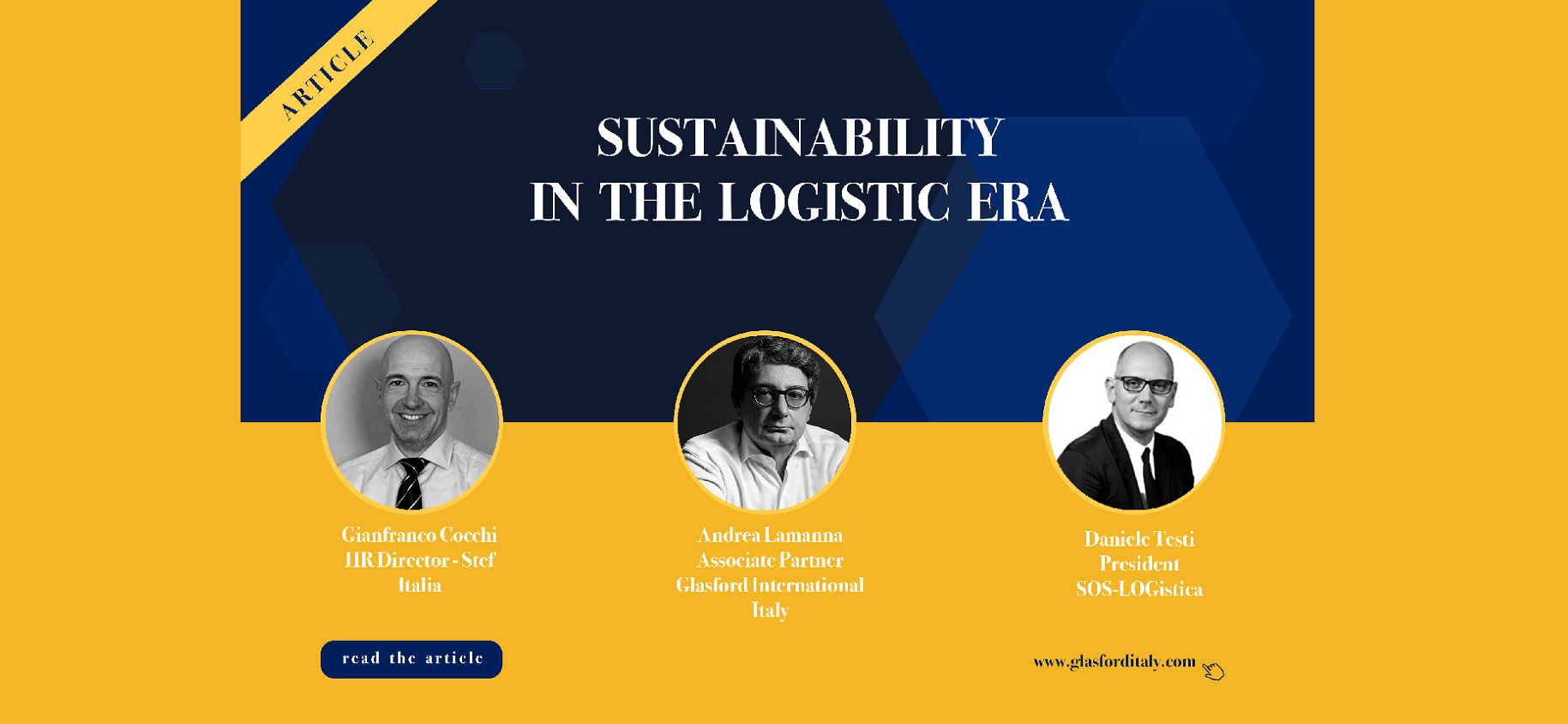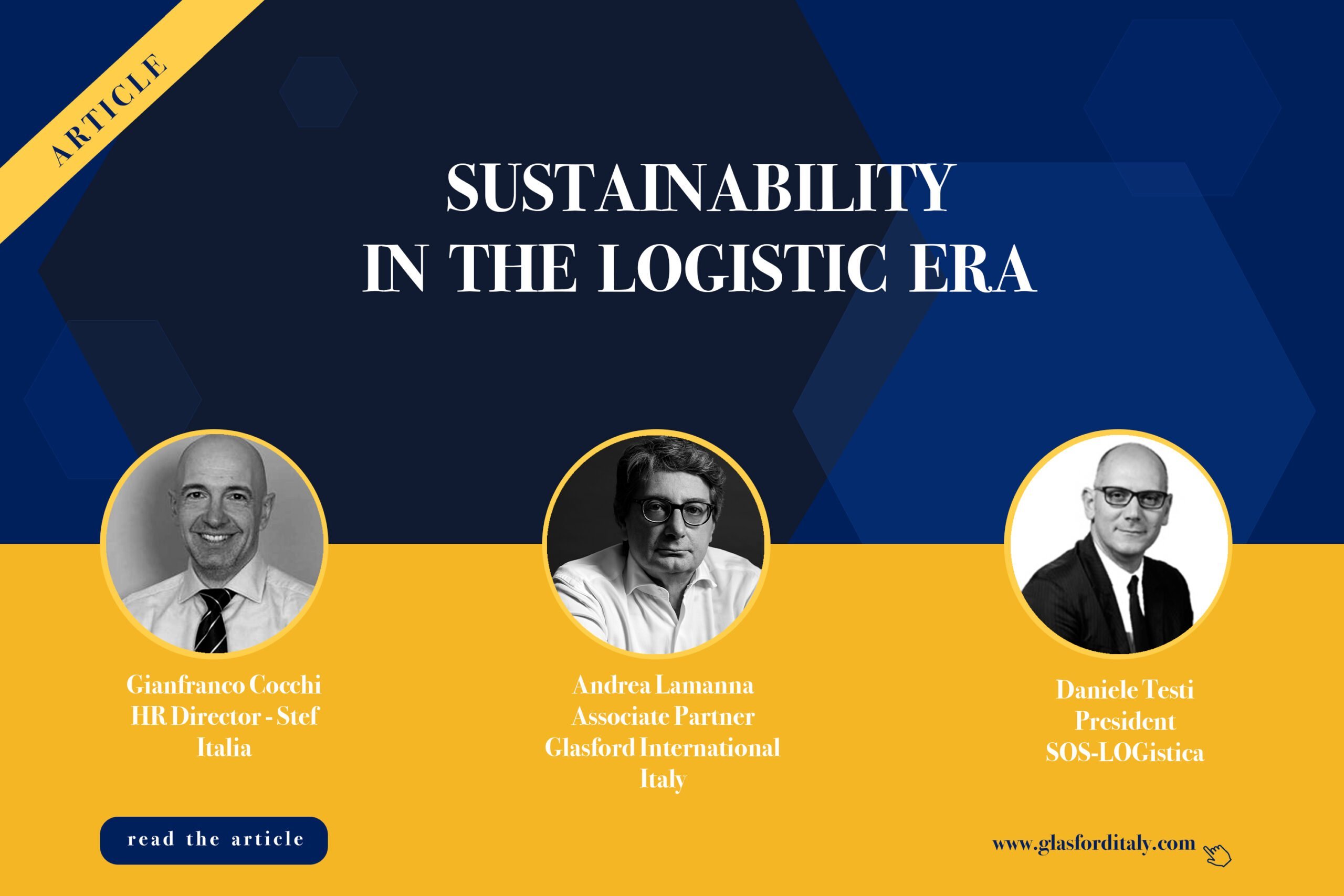
13. May 2021 Sustainability in the Logistic era

Based on what emerges from the IX Report on the social commitment of companies in Italy, promoted by Osservatorio Socialis, Italian companies have invested in 2019 the figure of 1.771 billion in shares of Corporate Social Responsibility and Sustainability, with an increase of 25% compared to 2017, and to invest was 92% of companies with over 80 employees.
These numbers bear witness to the increase in awareness of these issues, which, due to the significant correlation it maintains with strategic choices, are increasingly on the tables of decision makers in the company.
We at Glasford International Italy, in the light of the consulting expertise gained over the years alongside entrepreneurs, managers and heads of companies, we are particularly attentive in cultivating reflections and discussion on issues that we consider decisive for the value creation for the business system. One of these is the sustainability and we have decided to talk about it from one of the more important points of observation: the Logistics and the Transports in which we operate through mandates of Executive Search since more than twenty years in the sign of cross-fertilization and co-design.
Our Associate Partner Andrea Lamanna interviewed Daniele Testi, President of SOS-Logistica, and Gianfranco Cocchi, HR Director of Stef Italia, with the aim to better investigating what it means for a company to undertake into account ESG issues and what impact and opportunities they generate for their business and organizational front.
AL: Ing. Testi, what does it mean for a company that operates in logistics today to invest in terms of sustainability? How many are the declinations of sustainability?
DT: The theme of sustainability for a long time has been addressed by logistics operators as a purely environmental and ecological aspect. Improving its environmental performance meant investing in new technologies (means and infrastructure), with outlays that are not compatible with the average size of operators and with the cost pressures to which the sector has always been subjected. Only recently, and thanks to some initiatives such as those of the UN 2030 Agenda, has begun to decline sustainability on the different axes including the issues of social responsibility and economic sustainability. This, albeit slowly, is contributing to a transformation of the system and finally sustainability is perceived as a lever to innovate and be more efficient, resilient and competitive. Briefly, we look not only at the costs to improve our environmental performance but also at all the advantages that derive from it on the market in terms of customer loyalty, differentiation of the offer and risk mitigation. In this equation, according to SOS-Logistics, the association for sustainable logistics, born in Italy in 2005, enter two further variables:
1) policies, which will increasingly reward virtuous practices with regard to financial support and operational and settlement rules;
2) consumers or ultimate beneficiaries of logistics and transport services who will increasingly require guarantees on the environmental, economic and social impact of products purchased throughout the life cycle or from production to disposal/recycling.
AL: It seems to emerge clearly from its analysis that sustainability increasingly meets the strategic objectives of the company that operates in logistics, orient choices, create opportunities… What impact does this have on the business models of these companies?
DT: Yes, I confirm. Finally, these issues begin to permeate the development of business models, orienting them towards a more circular and less linear economy. In this new context the operators of the logistics are called to develop new competences and a culture of base more systemic that is able to bring out the value of the logistics and not only the costs and a more systemic basic culture that is able to bring out the value of logistics and not just costs. The tools are there and can derive from external initiatives such as all the regulations related to Quality, Safety and Environment or the certification of Benefit Company that is based on regenerative business models. Other tools have been conceived through a vertical industry experience, such as the sustainability rating developed by SOS-Logistica.
In summary, it can be said that the collaboration between the different interlocutors of the value chain, the objectivation on the results and metrics shared, together with the investment on new skills, are the key tools behind the development of sustainable logistics business.
AL: Mr. Cocchi, with Mr. Testi we have undertaken the exploration of ESG issues starting from the strategic agenda and the opportunities that this evolution is determining on the business front. In your view, what impact do these issues have on organizations?
GC: The pandemic has accelerated the need for innovation and the desire of the entire organization to participate consciously in the current change, thus reducing its resistance. Becoming a sustainable company, especially in our sector, implies first of all a different cultural approach, a change of mentality and perspectives that can be realized only if to support all this there is a strong commitment, a strong commitment and strategic vision on the part of the General Management, first and foremost, and the Steering Committee, proposing new ideas and solutions, sharing a process that involves the entire organization and relationships between people. This has allowed us to reduce the resistance to change and feed the flow of innovation within the company. This specified, the organizational impacts can have an echo in two different directions: in the definition of new professionality and in new modalities of working and procedures oriented to the respect of the environment (paperless, waste material recovery, working tools with low ecological impact, new real estate approaches, …)
AL: Also Mr. Testi mentioned the birth of new skills within this sector and in relation to emerging issues. Which professional skills are most significant in your sector?
GC: Controlled temperature food transport and logistics, a market that sees us as protagonists, is experiencing a significant and lasting change that we can also read in the impact that new technologies have in creating value through the protection of people and the environment. An example of this we read in the evolution of the roles of the Energy Manager and the Environment Manager who, in a market and in changing production contexts, are concrete witnesses of this transition through their mandate. It is no longer enough to “defend” the company from environmental risks. They are required to optimize processes, introducing new technologies to reduce environmental impact and energy consumption. The Energy Manager, first of all, is responsible for the Energy budget that allows to understand the real energy needs of the company and to propose strategies to reduce costs and consumption of the company effectively with projects ranging from the implementation and expansion of the capillary monitoring system of energy consumption, up to feasibility studies for interventions and new projects of Energy Efficiency and subsequent reporting of savings obtained, with a consequent impact on the income statement of the company.
AL: Thank you Mr. Cocchi. From the privileged point of view from which we observe the labour market, I can say that the professional family within which both the roles you mentioned operate is becoming increasingly visible and significant: HSE Management is increasingly a direct reporting function to the CEO and in some cases sits within the Management Team to the extent that the analyses and forecasts that arise from its observation point become crucial for determine business choices and, consequently, the organizational ones. I would add, among the roles, the CSR Manager, a position, born in the United States already in the ’50s but now increasingly significant within European companies and in our country. This is demonstrated by the fact that 35% of Italian CSR Managers have a direct report line with the CEO and 44% have only one intermediary towards the heads of the company and is a position that grows both in numerical terms and in terms of specific skills. If the first professional family originates from a solid technical/engineering/environmental background, the CSR role is a hybrid that draws a lot from the world of communication and marketing, institutional relations and organization.
The most innovative companies, in this sense it seems they are working for the constitution of a new business function, the ESG Management that seems to represent a right synthesis between the two roles, a hybridization between hard and soft skills that must increasingly travel together to be able to guide strategic choices for the generation of value in the medium/long term.
To conclude, we are convinced that the transition we are experiencing is an unprecedented opportunity. The world is seeing a paradigm shift. Businesses and organizations are increasingly aware of the need to launch a new development cycle that is much more economically, socially and environmentally sustainable. The ESG principles go hand in hand with the already known Key financial indicators to measure the effectiveness of a company and of investing in a company: the time of short-term operations seems to be over, and companies must have time to implement industrial plans aimed at creating value by placing human capital at the centre, making the most of people and skills.
Sustainability is not the future, but the present to be built and protected for the future. A future that people, companies, institutions must commit to realize every day to contribute to the evolution of the system.
At Glasford, we are also committed to supporting the heads of the company as advisors in the field of Executive Search and issues of organization and development, in line with the paradigm shift in place.

Sorry, the comment form is closed at this time.